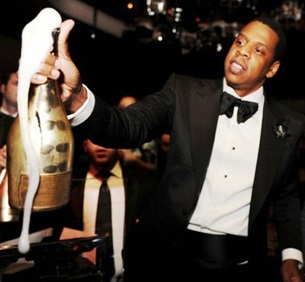Jay-Z [mr. in-between] Continues Partnership With Barneys and the NYPD Despite Racial Targeting Claims (encouraging niggers to shop online)
/From [HERE] and [HERE] Showcase Black, Jay-Z, who recently was pressured to drop partnership following racial profiling claims surrounding upscale retail chain Barneys New York Inc., has decided to continue their partnership. The rapper explains in a statement released on his site that he will also join a council fighting racial profiling.
"I have agreed to move forward with the launch of BNY SCC collection under the condition that I have a leadership role and seat on a council specifically convened to deal with the issue of racial profiling," Jay-Z says in the statement.
"The easy position would have been to walk away and leave policy making to others hoping that someone addresses the problem. I will not leave the outcome to others. I will take this into my own hands with full power to recommend, review and revise policies and guidelines moving forward. I am choosing to take this head on," he continues.
[do not blame or hate on showcase Blacks. Blame the white supremacists/racists who control the show. Showcase Blacks are not showcasing themselves, they are being showcased by white supremacists. MORE]
In addition, Beyonce Knowles' husband explains that profits from his BNY SCC clothing label will go to The Shawn Carter Foundation. The foundation will also receive 10 percent of all retail sales from Barneys New York stores nationwide and online on November 20.
For the last several weeks, the issue of the racial profiling of African Americans by major department stores has been front and center, with Barneys at its core and Macy's right behind. That is, in multiple episodes involving Black customers these white owned and controlled department stores targeted them for theft because they are non-white. Then, working in concert with the NYPD, black persons were unlawfully stopped, questioned, searched and detained by cops. In all reported cases the Black customers had done nothing wrong.
Trayon Christian, a 19-year-old mechanical engineering student, filed a civil rights lawsuit against Barneys. He says he was interrogated by police and released, in April, after purchasing a $349 Ferragamo belt with what the store alleged was a fake credit card. A month earlier, according to Kayla Phillips, a 21-year-old woman from Brooklyn, police swarmed her at a subway station, demanding to see her credit card. She had purchased a $2,500 Celine purse at Barneys. Again, no charges were filed. Her attorney says she has filed a lawsuit against the New York City Police Department and is planning to sue the upscale retailer.
In the case of Macy's, the actor Robert Brown, best known from HBO's "Treme", filed a lawsuit against the department store and the NYPD after he was held in an onsite jail following his purchase of a $1,000 Movado watch. Brown says he was targeted because he is black. In 2005, you may recall, Macy's paid $600,000 to settle a complaint about racial profiling at 29 New York stores. Late last week, another shopper charged that he was questioned in April by plainclothes cops three blocks away from the Macy's flagship store after buying $320 worth of Polo dress shirts and ties.
As these incidents unfold, advertisers are beset by lurking questions. How do we prevent a similar incident from happening to our companies? And if it does, what is the best action to take?
Barneys responded quickly to allegations. In a statement, CEO Mark Lee apologized and said, "no customer should have the unacceptable experience" of being accosted by police after leaving one of his stores. Barneys fired both security guards involved on the grounds of being "disgruntled employees," which their attorneys vehemently denied.
Lee hired Michael Yaki, who serves on the U.S. Commission on Civil Rights, to lead a review of the company's practices and procedures "to ensure that they reflect our continued commitment to fairness and equality." He also met with Al Sharpton and other civil rights leaders at Sharpton's National Action Network in Harlem. Sharpton described the meeting as "candid." His group also met with Macy's executives, Sharpton hinting afterward at a possible boycott: "We are not going through the holiday with people being profiled."
Both stores have a lot to lose. Andrea Hoffman, founder and CEO of Diversity Affluence, a consultancy firm for upscale brands, estimates the African-American luxury purchasing segment to represent about $90 billion. And according to the 2013 African-American 360 study by NewMediaMetrics, African Americans are more brand loyal than other groups. The study showed, for example, that African Americans were nearly twice as likely to be loyal to Macy's as the general population -- 40.1% to 24.1% respectively.
But, as Robin Givhan suggests in The Washington Post, the solution to Barneys problem may not be simple. She writes :
The company has long used exclusivity as part of its marketing strategy -- both by intention and default. And the subtext of exclusivity is that poor people, fat people, unattractive people, brown people are not the presumed clientele ... It's not as simple as filling the sales floor with black clerks, crafting a well-worded anti-discrimination policy or even offering an earnest apology. Sensitivity and suspicion run deep. It is positively existential."
Macy's serves a less exclusive base, but carries plenty of upper-scale fashion merchandise. Given the store's history of racial profiling accusations, it may not be off-base to assume that the problem is embedded in the company's culture. Years after an expensive settlement, the accusations of racial profiling persist. An article in last Thursday's Huffington Post asserts the same about Barneys. According to the piece , an "insider" alleged that "store security keeps a close eye on black shoppers who don't look famous."
Barneys as well as Macy's Inc. are under investigation following reports that the stores discriminated against black people. Jay-Z, real name Shawn Carter, says that he contacted the New York State Attorney General's office concerning the investigation, but the "findings are not yet available."













































































































































































































































































